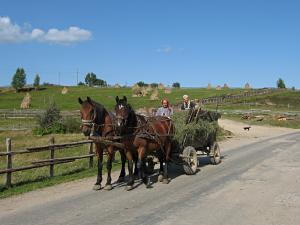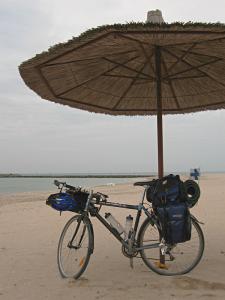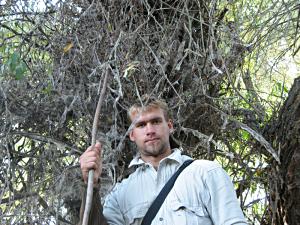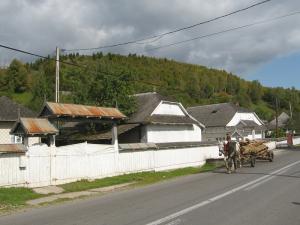Arto's Blog
Article on crossing Romania by bicycle
Posted: 2007-12-21 11:48:30, Categories: Travel, Romania, Moldova, Cycling, 75 words (permalink)A while ago a friend from the Finnish-Romanian Friendship Association asked if I could write an article about my bicycle tour in Romania for their magazine Viesti-Veşti. The article was published in the most recent issue and it's also available online (in Finnish).
I haven't actually seen the printed version yet, but as far as I know it was published unedited in full lenght. My visit to Moldova is also included in the article.
Romania and Bulgaria joining the EU
Posted: 2006-11-13 19:36:47, Categories: Travel, General, Romania, Bulgaria, 722 words (permalink)
 Both Romania and Bulgaria will join the European Union from the
beginning of year 2007. On the streets it hasn't been much visible
except for various signs telling about EU supported renovation and
construction projects, but in conversations it's naturally a hot
topic.
Both Romania and Bulgaria will join the European Union from the
beginning of year 2007. On the streets it hasn't been much visible
except for various signs telling about EU supported renovation and
construction projects, but in conversations it's naturally a hot
topic.
In both countries people in cities seems to be generally optimistic but there are also many who aren't really happy about the whole process. The marketing folks touted about more prosperity and other advantages, while critical voices during the negotiation process were few and far between. As the big date approaches also the less rosy aspects of EU integration are becoming more apparent.
Prices are rising, people say, while salaries are not. In particular property prices have climbed out of reach from ordinary people trying to save towards an apartment or house. After the collapse of communism apartments were generally given to the people living in them. Therefore most people have a place to stay, but for a young couple wishing to start a family the situation is difficult. Beneficiaries have been mostly the rich who have been able to work through corrupted municipality administrations. They are building ugly-looking but luxurious hotel complexes in places of natural beauty, eagerly waiting for new tourists.
EU will also impose new rules on the production of food, taxes on home-made alcohol and possibly outlaw certain traditional dishes. Otherwise most wouldn't care much of the whole EU thing, but invasions to the traditional ways of life is making people angry. Bulgarians have named their chief negotiator "the yes lady", saying she gave up too easily to all EU demands in order to guarantee the acceptance of Bulgaria for integration.
More positive changes brought by EU include efforts to reduce corruption, to fight organized crime, to increase transparency in the justice system and to improve the rights of ethnic minorities. There are also EU requirements concerning waste management and environmental protection which will hopefully result in a healthier environment for everybody.
Most of the debate around EU is centered around money. That's not a surprise, as it's a primarily economy-driven union. There may be some hard times in the beginning, but I have no doubts that eventually it will bring more wealth to the new regions. A more subtle question are the changes it will bring to the lifestyle. It's good if everyday life will become a bit easier and people will have more choice what to do with their lives. On the other hand, if every horse cart will be replaced by a tractor, if people will get their wine from a shop instead of their own or friend's barrel, if shepherds won't be following their sheep over beautiful hilly grasslands any more, something important will be lost forever.
Of course a lot of the changes have already been happening and would happen also without EU. It's the result of entering market economy and global markets after a long period of communism. Joining the EU will just speed up the whole process. Many young people have already for years moved abroad to gain better salaries and virtually every family has some family members or close friends working outside their homeland. EU will obviously make this even easier and it remains to be seen how many will return.
A detail which several Romanians mentioned to me is that while several Western European countries put restrictions on work permits for people coming from new EU member states, Finland decided to open doors for everybody. Traditionally Finland has been quite restrictive towards immigration, so it's interesting to see that in this case we're more open than many other EU member states.
Travelers in both Romania and Bulgaria are happy that becoming an EU citizen will mean visa-free travel to a larger number of countries. Curiously the change is not so big concerning traveling in Europe - neither Romanians nor Bulgarians have required visas for most European countries for years - but several Asian, South American and African countries will become easier to access after joining the EU.
One small change we'll all notice is that new banknotes will carry the text EBPO in addition to EURO and EYPΩ. Bulgarians are proud to mention that the cyrillic alphabet was invented by them (not Russians) and now it will become the third official alphabet in the European Union. Cool. :)
Autumn weather on the Black Sea coast
Posted: 2006-11-08 13:57:15, Categories: Travel, Romania, Bulgaria, 461 words (permalink)
 After Tulcea the weather started getting colder and windier. On the
first day we enjoyed roads lined with colourful trees with the wind
pushing us forwards. The following day we occasionally struggled to
advance even at walking speed while being beaten by a shower of
vertically flying sand from a nearby field. There was also some rain,
although mostly at night time. We passed many beautiful beaches but
didn't really feel like swimming. Riding through beach resort towns
was like trespassing abandoned land.
After Tulcea the weather started getting colder and windier. On the
first day we enjoyed roads lined with colourful trees with the wind
pushing us forwards. The following day we occasionally struggled to
advance even at walking speed while being beaten by a shower of
vertically flying sand from a nearby field. There was also some rain,
although mostly at night time. We passed many beautiful beaches but
didn't really feel like swimming. Riding through beach resort towns
was like trespassing abandoned land.
When entering Bulgaria it got even better: rain turned into sleet. After that the sun came out again and it all looked like a beautiful summer day - except that we were wearing all our clothes. One night we camped on cape Kaliakra and left a kettle half full of water outside during the night, discovering a thick layer of ice on top in the morning. I'm carrying a lightweight sleeping bag and it was approaching the limits of comfort.
Other than the coldness, cape Kaliakra was one of the most gorgeous camping places ever. We pitched our tents on a patch of grass just a few meters from a vertical drop of several dozen meters down to the sea. Full moon was casting a path of light on the water in front and ancient ruins provided wind protection in the back. I guess camping there wasn't officially permitted, but it wasn't explicitly forbidden in the rules of the area either. ;-)
My average daily cycling distances have become shorter than in the beginning of the journey. It's partly because Erte's riding speed is a bit slower than mine and we are making a lot of stops for taking photos, but mainly because the days have become shorter. Already before five o'clock in the afternoon we need to start thinking about where to stay. The sun sets after five and by six it's already dark. By going south I can maybe avoid snowstorms but cannot enjoy such long days as during summers in Northern Europe. Or at least to do that I'd need to go far, far further south.
Bulgarian part of the Black Sea coast is more hilly than the Romanian one. The vegetation is thicker and more lush, hinting we're in a warmer zone even though the temperature hasn't given that impression all the time. However, the biggest change has been the language. Romanian is based on Latin and I was able to pick it up a little bit during my stay there. Bulgarian belongs to the group of Slavic languages, which makes communication easier for Erte who speaks Russian but harder for me. At least I finally made the effort of learning the cyrillic alphabet so that I can read signs and other texts here.
Observing life in Danube Delta
Posted: 2006-10-29 11:07:17, Categories: Travel, Romania, 525 words (permalink)
 My next destination after Moldova was Danube Delta, a labyrinth of
canals and lakes in the area where the Danube river flows into the
Black Sea. I went there with Erte, a Lithuanian friend I already
mentioned last time I wrote. We slightly changed plans so that he
didn't eventually come to Bacau. Instead, we both headed further south
to Galati, met there and continued to Tulcea where the delta begins.
There we left our bikes in storage for a couple of days and used boats
and our feet to move around.
My next destination after Moldova was Danube Delta, a labyrinth of
canals and lakes in the area where the Danube river flows into the
Black Sea. I went there with Erte, a Lithuanian friend I already
mentioned last time I wrote. We slightly changed plans so that he
didn't eventually come to Bacau. Instead, we both headed further south
to Galati, met there and continued to Tulcea where the delta begins.
There we left our bikes in storage for a couple of days and used boats
and our feet to move around.
The Danube delta is especially known as a birdwatchers' paradise and for locals the first question is "How much fish did you get?". We were a bit late for the best bird season and not very interested in fishing, but discovered that the delta is also full of other lifeforms. Hundreds of frogs were jumping to the river and taking a swim before climbing back on the riverbank. A snake wiggled between exposed tree roots and performed artistic movements when I pointed my camera at it. Cows strolled around freely between bushes by the coast of the Black Sea. Fishermen were trying to catch the biggest pikes and other fish with their rods and reels.
Other highlights on our trip to the delta:
- Renting a small motor boat in Crisan, exploring the canals for a day and rowing back under the stars after the engine died
- Enjoying a free dinner (fish, of course) and accommodation in a pension after the boat trip
- Arriving to the Black Sea in Sulina, declaring it as a nude beach and rushing to swim
- Camping on the beach and waking up at seven to take photos of the sunrise
- Sharing meals with the captain of the houseboat where we stayed in Tulcea.
Before heading to the Danube Delta I spent a nice day with my friend Nelu from Bacau. We went about 25 km from the city to a small village called Magla, where I helped in picking grapes for one day. Like many Romanians Nelu also makes wine in his childhood home in the countryside. The house was small but beautiful and more than 100 years old. It currently mostly stays empty because Nelu's aging mother moved to an apartment in the city after the death of her husband some years ago. In addition to helping Nelu and seeing the village it was a great occasion to have an introduction to the traditional method of winemaking.
Nelu also gave me a suprise present: during my trip to Moldova he had completely cleaned my bike and oiled the moving parts. I'd be lying to say the bike runs as well as new - the age shows in some parts - but it's about as good as it was when I started my trip.
Today I'll continue with Erte towards south, where we should again reach the sea coast, this time by bike. Erte is not very eager to spend money on accommodation so it means more camping than earlier during my trip. On the other hand I have now good company which makes camping nicer than it would be alone.
Moldavian villages and monasteries
Posted: 2006-10-03 23:25:56, Categories: Travel, Romania, Cycling, 465 words (permalink) Last week I crossed the Eastern Carpathians from Transsylvania to the region of Moldavia. On the way there were still two places which deserve a special mention. At Lacu Rosu, a landslide pushed trees to the lake long ago. Still today dozens of dead tree stumps stick out from the water creating an odd landscape. Soon after Lacu Rosu, the road went through the impressive Bicaz gorges, some 300 meters high walls on both sides of the road. In certain places the road actually was partly below the rock.
Last week I crossed the Eastern Carpathians from Transsylvania to the region of Moldavia. On the way there were still two places which deserve a special mention. At Lacu Rosu, a landslide pushed trees to the lake long ago. Still today dozens of dead tree stumps stick out from the water creating an odd landscape. Soon after Lacu Rosu, the road went through the impressive Bicaz gorges, some 300 meters high walls on both sides of the road. In certain places the road actually was partly below the rock.
That was my farewell to the mountains for a while: after Bicaz the landscape turned into hills and later to flatland. My picture this time is from Pipirig, one of the villages where I could admire traditionally decorated houses. Some typical features are visible in the photo: a two-part gate featuring both a larger and smaller entrance, decorations on the walls and roof edges, and the ubiquitous horse-drawn carriage. I cannot count how many of them I've seen on this trip. The carriages normally move at about 10-15 km per hour, so usually at least ten times per day I find myself behind one. I take a look at my mirror making sure that no cars are right behind, and then accelerate to overtake as fast as possible.
In Moldavia I also went to see a couple of beautiful religious sites, namely the Neamt and Agapia orthodox monasteries. Although the trip was not a religious pilgrimage for me, the places were certainly worth a visit. I especially liked the Vovidenia hermitage close to the Neamt monastery and the older part of the Agapia monastery on top of a hill, featuring a pretty wooden church surrounded by a garden full of flowers.
At Lacu Rosu I also met Nelu, an avid cyclist who has traveled with the Romanian professional cycling team in many places around the world, working as a bicycle mechanic or volunteer organizer in the competitions. I got his contact info from a Romanian friend in Finland. It was very nice to spend a couple of days cycling with him, he was kind enough to reduce his normal average speed by about 10 km/h to match mine. :-)
At the moment my bike is at Nelu's apartment in Bacau and I'm on a short side trip using public transport. The main destination of this trip is an European capital - Chisinau in the Republic of Moldova! In Slovakia during Ecotopia biketour I met some Moldovans who are waiting for me there, and there's a big wine festival this weekend. I'll head to the border tomorrow, armed with a printout of a web page which says I should be able to get a visa free of charge, conveniently because of the festival. Well, I'll see what happens.

Copyright Arto Teräs <ajt@iki.fi>, licensed under the Creative Commons Attribution-Share Alike 3.0 Unported License. (Unless otherwise mentioned in individual photos or other content.)